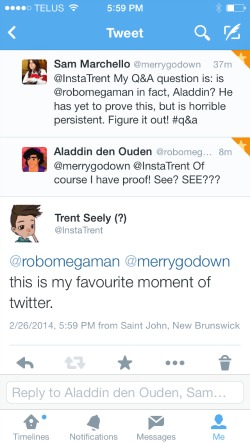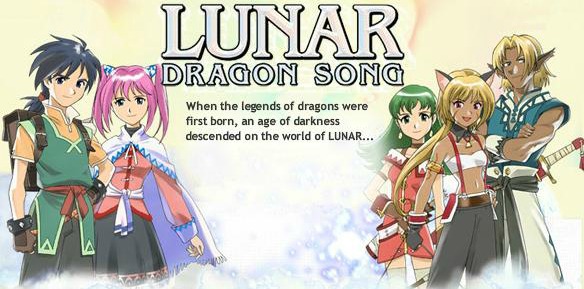|
|
|
Welcome to another edition of the
Mailbag! You may have already seen it on the forums, but
we're running a special challenge. Basically what you'll
be required to do is replay your most hated/least favorite
Final Fantasy and then send in your thoughts to the
RPGamer Mailbag. You can find all the details about it in
the forum
thread here. One random entrant will get a free RPG
of their choice (released this year)!
Also, I'm not Michael Apps. He's taking a week off to do...things. He hasn't been tremendously explicit on his activities, but I'm assuming it's nothing illegal. I'm Trent, whom you may be aware of if you regularly read RPGamer's Editorials or the Currents column. I'll do my best as his replacement, but this week's format will mostly be focused on Twitter questions (as I got a ton of them). Don't worry — both Wheels and your regularly scheduled content will be back next week.
- Trent Seely
|
This Edition's Contents:
|
|
A Hailstorm of Tweets
Trent's Comment
Hmm. I'd have to say that neither is solely responsible for effective or engaging RPG storytelling. One of the problems inherent to fantasy storytelling is the suspension of disbelief. As the player, we begin each RPG experience with the understanding that we're playing a video game. The hope is that the RPG is narratively structured in such a way that we stop focusing on the fact that we're holding a controller, and begin to develop a bond with what is happening in-game.
The setting in which the narrative is crafted and the characters we're eventually exposed to are both tremendously important factors in how well the plot of the game resonates with us. By asking which of these two elements "defines" RPG storytelling, you are presenting a false dichotomy. These two elements are symbiotic in nature — the characters and the relationships they share are ultimately informed by the settings they inhabit, and the settings themselves are informed by the perspective and relationships of the characters. Both are very much important in engaging you in the events of the game's plot.
Ultimately, I believe that RPG narratives are only as strong as their messaging. Of all the themes we've seen over the years in this genre, the strongest ones relate to humanity or human fears: life, death, growth, depression, selflessness, rebirth, and so on. A lot of people like Final Fantasy VII not because of the setting or Cloud's individual relationships, but because of larger concepts like the Lifestream or major, thematic events like Aerith's death. These are relatable to the human experience and as a result make the narrative feel more genuine and impactful.
|
Trent's Comment
*SPOILER ALERT: Please ignore this section if you haven't completed Persona 3 & FES*
To begin, I don't think the original Persona 3 has a terrible epilogue. Really, I don't. All things considered, it's pretty fitting. It just makes me sad that there is still one character left caught in limbo — your character. In the SEES' final confrontation with Nyx, which is essentially the personification of death itself, your social links give you the power to fight all of humankind's negative feelings that drew Nyx to Earth in the first place. You create the final arcana and eventually perform the Great Seal supposedly in order to seal Nyx away. You then cling to life for a bit, only to go comatose in Aigis' lap on Graduation Day.
FES, or "The Answer," is the following epilogue. You're informed that your character died the day after he fell into his deep slumber. Aigis keeps his Evoker and both she and the remaining SEES continue to see his silhouette. They venture forth into the Abyss of Time where it is discovered that the silhouette was just a shadow. The real protagonist is later seen as a statue, crucified on what appears to be a door between Nyx and humanity. It's revealed that Nyx only awakened because Erebus, a maniFEStation of humanity's grief, was reaching out to it. In truth, the protagonist wasn't sealing Nyx — he was acting as a barrier between Nyx and Erebus in order to save all of humanity. In this sense, he cannot be saved as his sacrifice is the only thing stopping a world-wide apocalypse.
The frustrating thing about the FES epilogue isn't that it is bad. It's just that only a few things were resolved and the one thing we thought would be — the protagonist's sacrifice — never was. Everyone basically walked away accepting the fact that he was gone forever, which would have been fine if the entire basis of FES didn't tease that a part of him still existed. It essentially gave me blue balls.
We learn from Margaret in Persona 4 that Igor's former assistant, Elizabeth, left her role in the Velvet Room in order to find a way to free the protagonist of Persona 3 from the seal. In fact, Elizabeth fights in Persona 4 Arena in order to become strong enough to accomplish some "immense task." She eventually gains the Fool Arcana, which signifies that she's about to break out on her own journey — perhaps to save the blue-haired protagonist? I hope so.
I can't very well provide a better epilogue, as there is still a possibility that Persona 3's protagonist can still be saved by Elizabeth in Persona 5 or a future spin-off title. I just find it frustrating that they gave you a shred of hope that you can save him in FES, only to take that hope away in the most anticlimactic fashion.
|
Trent's Comment
I'm just going to allow the following exchange speak for itself...  
|
Trent's Comment
I can't believe that I agreed to cover your shift on Mailbag, only for you to turn around and request a 500-word response on such a niche subject. In what world is that reasonable? I have half a mind to ignore this request out of spite, but I'm in a generous mood so I suppose I can humor you just a little.
Yes, SaGa was once an excellent RPG franchise. This is due in no small part to the involvement of Akitoshi Kawazu. I could just write a professional biography for Kawazu and I'm sure Wheels would be happy with that alone, but instead let's look at what set SaGa apart from other JRPGs of its time.
The SaGa series is a JRPG series that defies many tropes and conventions typically found in the subgenre. Unlike Square's flagship Final Fantasy titles, the SaGa games were mostly known for being tremendously non-linear in approach to exploration and character development. Most plots, at least in later titles, featured branching points, side quests, and the sequential selection of characters — as opposed to having control of all characters simultaneously as with other RPGs. In fact, in Romancing SaGa you could even complete quests in any order you saw fit and your choices would ultimately affect the outcome of the story. Part of this scenario-driven dynamic can be credited to Koichi Ishii, who is also known for creating the Mana series (and as such remains one of my favourite people on this planet).
Now, instead of following your request to the letter and writing 500 words on the topic of "why SaGa is awesome," which would probably bore most readers to tears, I'll do two things: (1) humbly request that those reading who are interested and have not played a SaGa game try to get their hands on Romancing SaGa: Minstrel Song and SaGa Frontier 2 in order to understand the true greatness of this series, and (2) break your fanboy heart by discussing why SaGa is no longer awesome.
This series jumped the shark with Unlimited Saga (a game that couldn't even get the spelling of its own title right), and I can't see it ever coming back as it once was. Please don't play Unlimited Saga. It's a poor excuse for a SaGa game and is more of a virtual board game than it is an RPG. It's also stupidly hard and pretty much killed off any chance of a main SaGa game ever coming west again. Emperor's SaGa managed to be even more disappointing as it was a Japan-only social GREE card playing game and mostly just a cheap cash-in. To be frank, this series isn't what anything like it once was and hasn't been truly great since the late 90s.
I know, as a Mana fan, it can be hard to accept when your favorite franchise's day in the sun is long over, but it is better to make peace with the truth. Like Mana, SaGa will always have spectacular entries which still hold up to this day. Sadly, I think both franchises need to be put to pasture for a while — lest we get any more terrible mobile phone wannabes.
|
Trent's Comment
I suppose I would define a battle system as any group of gameplay mechanics related to engaging enemies with items or commands. To that point, commands could be selected on the fly or strategically, based on the type of battle system implemented in the RPG you're playing. The most straightforward would likely be turn-based, while the most frantic would be active.
Personally, I'm a big fan of battle systems that incorporate time-to-action in the selection of commands. The Grandia series, I believe, does this best. You can see an "IP gauge" in which it is clear how soon both you and your enemies will be able to select commands. Once you are at the point where you can select those commands, your choices will hinge on the time it takes for the execution of those commands. You could implement powerful spells or moves that take a while to be executed, but it might be a better idea to select maneuvers that are less powerful and can quickly cancel your enemy's commands before they are executed on you. Many games allow you to determine what moves will be the best based on health, magic, or ability points, but too few (in my opinion) require you to consider timing as well.
|
Trent's Comment
I would say that it is best for the gamer if he or she holds off on the purchase of any game until they sit at a better price point. I rarely buy new games anymore, and part of that has to do with the realization that paying $60 or $70 for a new title is ridiculous and a horrible waste of money. It may not be to everyone's liking, but I usually wait until I can find games pre-owned for $20-30 before I actually pick them up. In the meantime, I try to whittle away at my foolishly large backlog. I suggest doing that, not that you couldn't also be satisfied by purchasing and playing indie titles.
|
Trent's Comment
I'm no fan of Dragon Age II. The character models, environments, and overall art design were lazy, your party — excluding Varric and Isabela — are downright unlikeable, leaps in time broke up the story too much, narrative loose ends were abundant, most game mechanics were ripped off from Mass Effect, environments were reused ad nauseam, DLC was both lackluster and overly expensive, the conversation system was dumbed down, and I felt like committing seppuku while waiting through every lengthy loading screen. So yeah, you could say I despise this game.
How would I remake it? Well, I'd start by not using a freaking hub-world. In an age post-Oblivion, why would any designer think it smart to tie the hands of the player in terms of exploration? Players would benefit from an open world that they can actually explore. None of this illusion of choice crap. I'd also demand at least another full year of development, considering that Dragon Age II reeks of being rushed out the door by EA — the many bugs in the relationship system are just one example of this. One of the few things I like about the game is how fast and fluid the combat can be. My only problem is that it comes at the expense of strategy. If Bioware could better incorporate the tactical approach of Dragon Age: Origins/Awakening with the faster pace of Dragon Age II, I think everyone would be blown away. Finally, I would also demand both better scenario writers and a new game engine. Not only does this title somehow look worse than its predecessor, but the quality of quests and the strength of the plot both fall extremely short of bar Bioware had previously set.
|
Trent's Comment
I've never played an Idea Factory game, and as such have nothing to say on this topic. *thumbs up*
|
Trent's Comment
We did see a third Lunar game. It was called Dragon Song. Don't you remember how well that turned out?  Seriously though, considering the success of Silver Star Harmony, I would like to think that there is hope left in this franchise. At the very least we deserve a remake of Eternal Blue.
|
Trent's Comment
I forgot to sacrifice a goat on the Vernal Equinox last year. I swear, you lose your day-planner and the whole world goes to hell.
Kidding aside, I understand that Nier fans are expecting it to be a spiritual successor to Nier. Ultimately, I'd just like the upcoming sequel to not resemble Drakengard or Drakengard II — two games that were piss poor rip-offs of both Panzer Dragoon and Dynasty Warriors.
|
Trent's Comment
Long in-house development times for Square-developed games and an overwhelming amount of Eidos releases? Let's be real: the company's main strategy (as it stands now) appears to be mostly focused mobile releases and ports; quick cash grabs that please investors and mitigate development risks. I don't see that changing anytime soon.
|
Trent's Comment
Games that are narrative-driven, but don't rely on player agency to propel the plot could make excellent films. The only challenge is that many games require more than two-hours to tell their story. That being said, I feel as though Uncharted, L.A. Noire, or The Last of Us would make excellent films without having to lose too many plot elements in the process. Whereas, some extremely deep story-driven games like Deus Ex or Bioshock could never properly make the transition.
I feel as though most movie-based video games fall-flat because the game designers try and fit the movie in a pre-made genre template. For instance, the Transformers movies have always had beat 'em up video games because the movies have always been action-packed. However, wouldn't a Tranformers fighting game similar to Super Smash Bros. be a cool change of pace? What about an adventure-platformer similar to Ratchet & Clank or Infamous? There's a lot of room for experimentation. With all that said, I would love to play a Telltale Games style interactive adventure title based on Shawn of the Dead. I know that sounds a little hokey, but Telltale's brand of story-driven humor would jive well with Edgar Wright and Simon Pegg's zombie satire and branching paths could only extend an already enjoyable experience.
If we're looking at movies and games that could never successfully leap mediums, I would have to say that I would never play a game based on Paul Thomas Anderson's Magnolia, regardless of genre, and I would never watch a movie based on Zelda: The Wand of Gamelon for the Phillips CD-i.
|
Trent's Comment
For the uninitiated, I recently adopted a kitten named Pancakes.  So far, Pancakes is pretty similar to Myau the Musk Cat from Phantasy Star: playful, highly intelligent, and nimble. That said, I'm kind of hoping Pancakes turns into Mao from Shadow Hearts: From the New World: fat, always up for a party, and never putting up with people's BS.
|
|
|
Hot Topics
Here's some hot topics I've seen around
the net:
- What do you think of Thief's negative reception?
- Should Konami stop making 2D Castlevania games?
- Is it weird that South Park: The Stick of Truth is being censored in Europe?
Don't forget to leave Wheels some
questions and such for next week!
|
| Mailbag Archive
|
|









